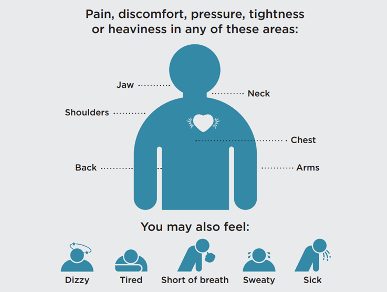A heart attack or Myocardial Infarction MI is a blockage within the coronary arteries occluding the blood flow to the heart muscle.
Heart attack (Myocardial Infarction)
Symptoms of a heart attack
Symptoms do vary from person to person, yet the typical symptoms of a heart attack include:
- Discomfort in your chest that happens suddenly and doesn’t go away
- Tightness or pain in the chest, neck, back or arms
- Abnormal heartbeat
- Sweating, fatigue, or lightheadedness
- Nausea or vomiting
A heart attack is a medical emergency.
Please seek medical assistance or dial 111 immediately.
Heart disease is the most common cause of death for women and men in New Zealand.
Women and men share the same risk factors for heart disease which include:
- smoking
- being overweight
- being inactive
- high blood pressure
- high cholesterol
- family history
- diabetes
Women tend to experience more subtle symptoms and traditionally this has delayed the timing of seeking medical attention.

What causes a heart attack?
Most heart attacks are caused by coronary heart disease (CHD) also known as ischemic heart disease (IHD).
CHD causes your coronary arteries to become narrowed by a gradual build-up of atheroma (plaque).
The plaque creates occlusions within your coronary artery and makes it difficult for the artery to carry the required blood to the heart muscle.
Types of heart attacks
NSTEMI
NSTEMI is a partial blockage of the coronary artery known as a Non-ST-Elevation Myocardial Infarction.
STEMI
A STEMI is a total blockage of the coronary artery known as an ST Elevation Myocardial Infarction. This causes your heart muscle to be starved of blood and oxygen.
How is a heart attack diagnosed?
Time to diagnosis and treatment is critical when having a heart attack.
“Time is cardiac muscle”
Diagnosis of a heart attack includes:
Treatment of a heart attack
- Urgent treatment to get the blood flowing to your heart muscle again is crucial when experiencing a STEMI.
- A coronary angiogram plus or minus coronary angioplasty is a potentially life-saving procedure and will reduce the amount of permanent damage to your heart.
- A coronary angioplasty re-opens the blocked coronary artery.
- Depending on the location and size of the stenosis within the artery will be treated with ballooning of the vessel and deployment of one or more stents.
- The stents will keep the narrowed artery open and return the blood flow to the myocardium.
- Your stay in hospital will depend on your treatment and recovery.
Cardiac rehabilitation
After a heart attack, you should be referred to cardiac rehabilitation (cardiac rehab). Each rehab group is slightly different yet usually involves regular assessments, advice and guest speakers, exercise sessions and group discussions.
The cardiac rehab attendees provide an outlet of support and understanding of your recent cardiac issues. A heart attack can be a frightening experience and it can take time to come to terms with all events.
It’s natural to be worried about your recovery. Feeling scared, frustrated, and isolated during this time is a normal response yet there is always help and assistance on hand.
Cardiac rehab will provide support and guide you on your road to recovery.
Practical matters like driving (you will not be able to drive a car for two weeks after a heart attack), going back to work and finances may cause concern after a heart attack, and we advise that you seek appropriate guidance and reassurance regarding these lifestyle issues.
When should I get checked for risk factors for heart disease?
The age you should start having heart checks depends on:
- your ethnicity
- your personal medical history
- your family health history
Your GP will assess and discuss ways you can lower your risk of heart attack and stroke.
For further information, we recommend that you review the Cardiovascular Disease Risk Assessment and Management from the Ministry of Health at www.health.govt.nz
If you have any queries or concerns regarding the above information, please contact our experienced Cardiac Nurses at Ascot Cardiology Group.

GP Practice Points
Sign up for our GP Practice Points and keep up to date with the
latest news, case studies and Symposium information.
Ascot Hospital, Level 3
90 Greenlane East
Remuera, Auckland 1051
PO Box 17 187,
Greenlane, Auckland 1546